Sesame Oil For Acne: 6 Key Benefits And How To Use
A simple ingredient that soothes your skin and eliminates those pesky pimples!
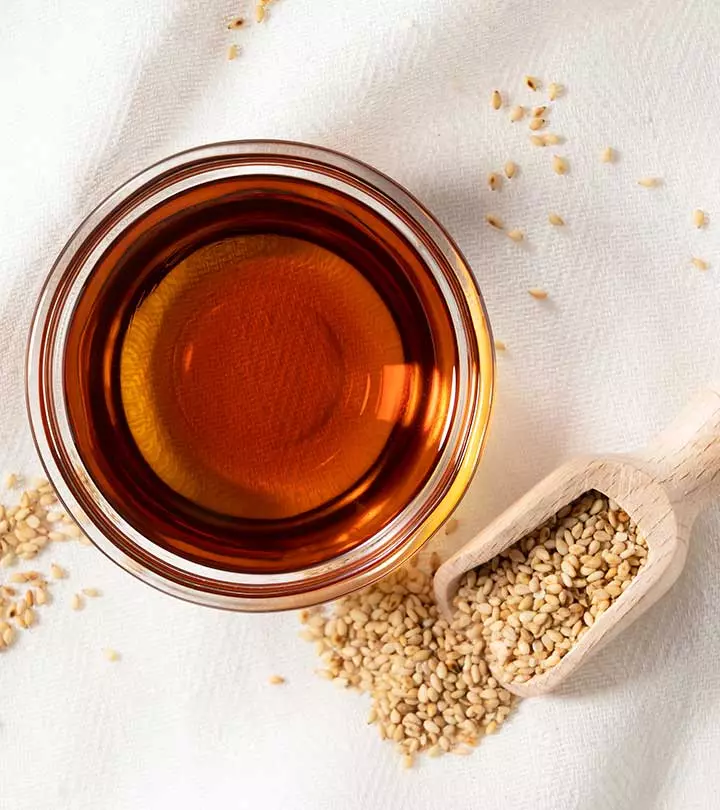
Image: Shutterstock
Have you ever used sesame oil for acne? If not, you should give it a try. Sesame oil is extensively used in skin care products. Apart from its culinary uses, it is a part of traditional medicine to treat skin care ailments (1) and overall wellness of the skin. Sesame oil is also beneficial for maintaining your hair and skin health. If you are looking for natural remedies for treating acne breakouts, you can rely on sesame oil. Wondering how it works? We have the answers right here. Keep reading to learn more about how sesame oil may help heal acne and more!

 Fun Fact
Fun FactIn This Article
Benefits Of Sesame Oil For Skin
There are many Sesame seeds’ benefits as sesame seeds are a versatile ingredient that can add a whole new level of nourishment to your health and skincare routine. Moreover, sesame seeds have added benefits, especially for the skin. Discover the fantastic perks this oil brings to your skin.
1. May Help Treat Acne
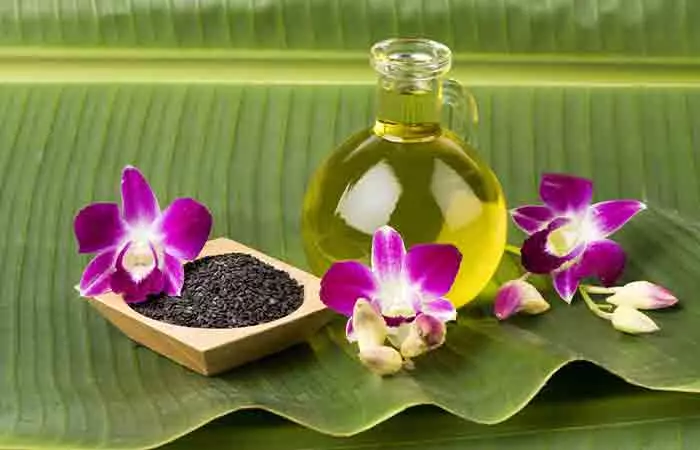
Sesame oil contains sesamin that has anti-inflammatory properties (2). This compound may help ease the inflammation associated with acne breakouts.
2. May Not Clog Pores
Anecdotal evidence suggests that refined sesame oil may work without clogging pores. Since clogged pores may lead to acne breakouts, this non-comedogenic property of sesame oil may help reduce acne.
3. May Heal Wounds
Sesame oil has anti-inflammatory and antioxidative properties.
In one study, the oil was found to help heal burn wounds (3). More research is warranted to understand if sesame oil has similar effects on all types of wounds.
4. May Slow Down Aging Signs
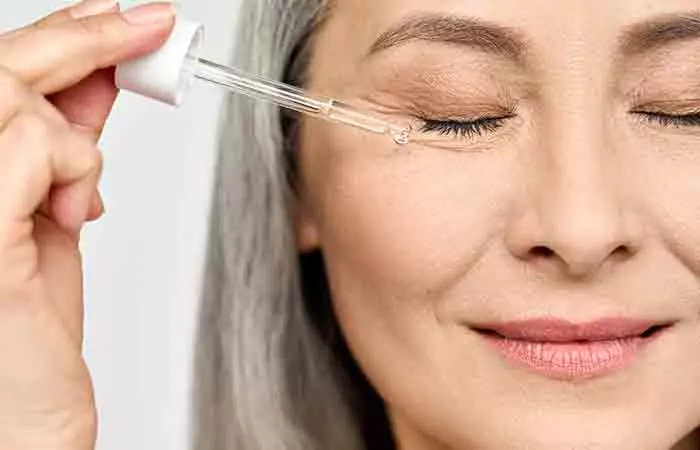
Sesame oil is known for its anti-aging properties (4). Its antioxidant properties combat free radical damage and may prevent wrinkles and other aging processes from showing up on your face. It also has anti-carcinogenic properties that may help in preventing skin cancer as well.
5. Protects From UV Radiation
Sesame oil has been scientifically proven to resist 30% of ultraviolet rays (5). Thus, it may help alleviate UV-induced skin problems, such as inflammation, wrinkles, sunburns, premature aging, and free radical damage that can negatively impact the skin barrier. This natural ingredient can be combined with your sunscreens for adequate sun protection and nourishment.
6. Moisturizes Dry Skin
Sesame oil is used as an emollient in the cosmetics industry (6). Its chemical composition includes a nourishing blend of hydrating and skin barrier-fortifying fatty acids like linoleic, oleic, palmitic, and stearic acids. It is also rich in vitamin E, which is a powerful skin care ingredient with antioxidant properties that keep several skin disorders at bay (7).
A blogger shares the results of using sesame oil on her skin: “I could apply sesame oil in the morning and still have hydrated-looking skin 12 hours later. I was not only saving hundreds of dollars, I was feeding my skin a tasty chemical-free treat, and the results were superb (i).”
Sesame oils antioxidant and anti-inflammatory properties may help treat acne and the associated inflammation. But how can you use it?
Key Takeaways
- Sesame oil contains sesamin, which has anti-inflammatory properties that may help reduce the irritation caused by acne.
- You can mix it with apple cider vinegar, rice flour, or turmeric to treat acne.
- Sesame oil is generally safe to use and has no negative side effects.
How To Use Sesame Oil For Acne
1. Apple Cider Vinegar And Sesame Oil
Apple cider vinegar contains antibacterial and antimicrobial properties (8). It may help treat acne while sesame oil could help ease the inflammation.
What You Will Need
- 4 tablespoons of apple cider vinegar
- 4 tablespoons of sesame oil
- 2 tablespoons of water
What You Have To Do
- Mix 4 tablespoons each of apple cider vinegar and sesame oil with the 2 tablespoons of water.
- Apply the mixture to your face.
- Leave it on for 20 minutes.
- Wash it with normal water.
How Often You Should Do This
Do it once a day.
2. Rice Flour And Sesame Oil
Anecdotal evidence suggests that rice flour may help absorb the excess oil from the face.
It could help reduce acne breakouts when used with sesame oil.
What You Need
- 1 tablespoon of rice flour
- 2 tablespoons of sesame oil
What You Have To Do
- Mix the rice flour and sesame oil in a bowl.
- Apply the paste all over your face.
- Leave the paste on your face for 20 minutes and wash with cold water.
How Often You Should Do This
Do it once a week.
3. Turmeric And Sesame Oil
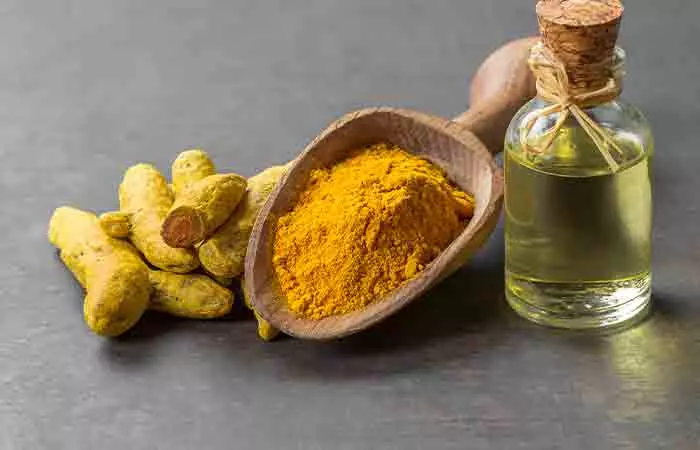
Turmeric is known for its antiseptic properties that may help heal your skin. It also has anti-inflammatory and antioxidant properties that help treat acne (9).
What You Will Need
- 1 tablespoon of turmeric
- 4 to 5 tablespoons of sesame oil
What You Have To Do
- Mix the turmeric and sesame oil in a bowl.
- Apply the mixture to the affected areas of your face.
- Leave the mixture on for 30 minutes and wash with cold water.
How Often You Should Do This
Do this once a day.
 Quick Tip
Quick TipThere are a few other ways you may use sesame oil on your face. We have discussed them below.
Other Ways To Use Sesame Oil For Acne
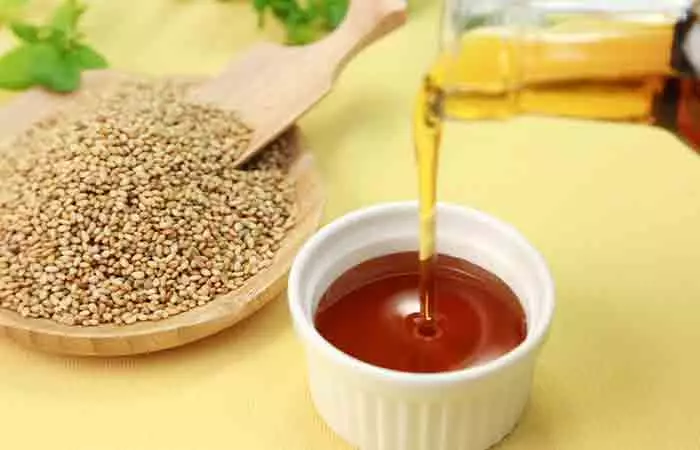
- You may soak cotton balls in sesame oil. Apply those oil-soaked balls gently on the acne-affected regions of your skin. Let the skin absorb the oil for 20 minutes or so. Wash with a mild medicated soap or cleanser. Of course, you may prefer to leave the oil on your body overnight and have a bath in the morning.
- You may also apply sesame oil to the acne spots and sit beside a bathtub filled with hot water. The steam will unclog the skin pores and allow the sesame oil to seep in better.
- You may use sesame oil for cooking foods to enhance its effect on your skin. It contains an antioxidant (sesamol) that increases when the oil is cooked (10).
Let us now see if you must take any precautions while using sesame oil.
Precautions To Be Taken While Using Sesame Oil
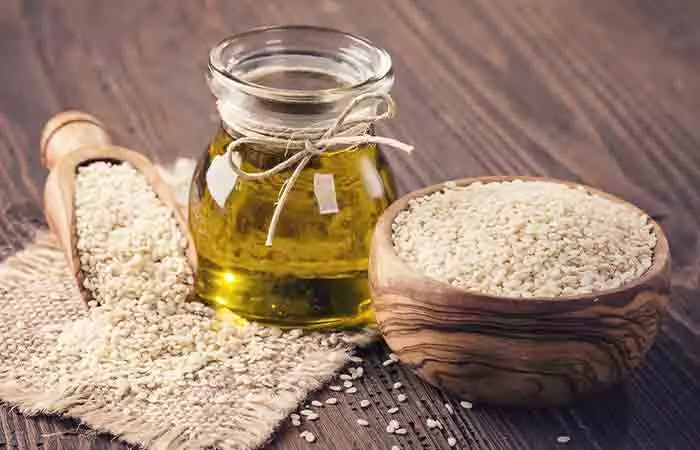
Sesame oil is generally safe for everyone to use without any side effects. However, those with oily skin must use it sparingly in small quantities.
Infographic: Benefits Of Sesame Oil For Acne + How To Use
While sesame oil is commonly used in cooking, it has also been used for centuries to treat various skin issues. It has anti-inflammatory and antioxidant properties that may help combat acne and prevent future breakouts. Check out this infographic to learn about its benefits for acne and how to incorporate it into your skincare routine.
Some thing wrong with infographic shortcode. please verify shortcode syntaxThe research on sesame oil’s effect on acne breakouts is limited. However, anecdotal evidence claims that using sesame oil for acne may help soothe the inflammation. In addition, sesame oil provides various other skin benefits and treats acne. This oil can help slow down the aging process and keep the skin smooth. Sesame oil is also relatively safe to use without causing any negative effects. On the other hand, those with oily skin should use them in moderation. You can follow the tips discussed in the article to incorporate this oil into your daily skin-care routine and get the effects.
Frequently Asked Questions
Is it okay to mix sesame oil with other oils?
Yes, sesame oil can be mixed with other oils like olive oil, coconut oil, and almond oil to enhance its overall nutritional value, making it a suitable choice for skin care applications.
Is sesame oil good for oily acne-prone skin?
Sesame oil is non-comedogenic and may work well on oily acne-prone skin.
Is coconut oil or sesame oil better for the skin?
Sesame oil contains skin-loving nutrients and is better for rejuvenating the skin. In addition, it protects your skin from moisture loss. You can take advantage of coconut oil’s moisturizing and rejuvenating properties if you don’t have acne-prone skin.
Is sesame oil a good skin moisturizer?
The presence of essential fats in sesame oil makes it an effective skin moisturizer. It helps keep your skin soft and hydrated.
Does sesame oil tighten skin?
Yes. According to one study, toners enriched with sesame oil help tighten the skin (11). Also, it can control the enlargement of skin pores, maintaining the beauty of your skin.
What is the difference between sesame oil and sesame seed oil?
Sesame oil is made from raw, pressed seeds, while sesame seed oil is made from toasted seeds.
Can I mix sesame oil with coconut oil?
Yes. You can mix sesame oil with coconut oil. They offer the essential skin nutrients and keep your skin hydrated.
Can I combine sesame oil with essential oils?
Yes, you can combine sesame oil with essential oils. However, essential oils are highly concentrated and can cause skin reactions and allergies if not diluted properly.
Illustration: Is Sesame Oil Good For Acne?

Image: Stable Diffusion/StyleCraze Design Team
Discover the benefits of using sesame oil for acne in this insightful video. Unlock the secrets to clear, blemish-free skin. Watch now and upgrade your skincare routine today.
Personal Experience: Source
StyleCraze's articles are interwoven with authentic personal narratives that provide depth and resonance to our content. Below are the sources of the personal accounts referenced in this article.
i. Sesame Oil: Get the JLo Glowhttps://bondiorganic.wordpress.com/2014/03/11/semame-oil-get-the-jlo-glow/
References
Articles on StyleCraze are backed by verified information from peer-reviewed and academic research papers, reputed organizations, research institutions, and medical associations to ensure accuracy and relevance. Read our editorial policy to learn more.
- Value addition in sesame: A perspective on bioactive components for enhancing utility and profitability, https://www.ncbi.nlm.nih.gov/pmc/articles/PMC4127822/
- Antinociceptive and anti-inflammatory activities of the Sesame Oil and Sesamin, https://www.mdpi.com/2072-6643/6/5/1931
- Healing effect of sesame ointment on second-degree burn wound in rats, https://www.researchgate.net/publication/304675692_Healing_Effect_of_Sesame_Ointment_on_Second-degree_Burn_Wound_in_Rats
- Hepatoprotective effect of sesame oil against lead induced liver damage in albino mice: histological and biochemical studies, https://www.researchgate.net/profile/Azab-Azab/publication/283461136_Hepatoprotective_effect_of_sesame_oil_against_lead_induced_liver_damage_in_albino_mice_Histological_and_biochemical_studies/links/5638e1c108ae78d01d3a0509/Hepatoprotective-effect-of-sesame-oil-against-lead-induced-liver-damage-in-albino-mice-Histological-and-biochemical-studies.pdf
- Potential of herbs in skin protection from ultraviolet radiation, https://www.ncbi.nlm.nih.gov/pmc/articles/PMC8837976/
- Bioactive-Based Cosmeceuticals: An Update on Emerging Trends https://www.ncbi.nlm.nih.gov/pmc/articles/PMC3263051/
- Vitamin E in dermatology https://www.ncbi.nlm.nih.gov/pmc/articles/PMC4976416/
- Antimicrobial activity of apple cider vinegar against Escherichia coli, Staphylococcus aureus and Candida albicans; downregulating cytokine and microbial protein expression, https://idp.nature.com/authorize?response_type=cookie&client_id=grover&redirect_uri=https%3A%2F%2Fwww.nature.com%2Farticles%2Fs41598-017-18618-x
- Turmeric As Medicinal Plant For The Treatment Of Acne Vulgaris, https://www.pharmatutor.org/articles/turmeric-as-medicinal-plant-for-the-treatment-of-acne-vulgaris
- Changes of ingredients in the process of cooking of sesame oil, https://www.ncbi.nlm.nih.gov/pmc/articles/PMC3336598/
- Herbal Cosmetics: Used for Skin and Hair https://www.researchgate.net/publication/235944029_Herbal_Cosmetics_Used_for_Skin_and_Hair
Read full bio of Dr. CP Thajudheen
Read full bio of Sucharita Mishra
Read full bio of Eshna Das
Read full bio of Swathi E







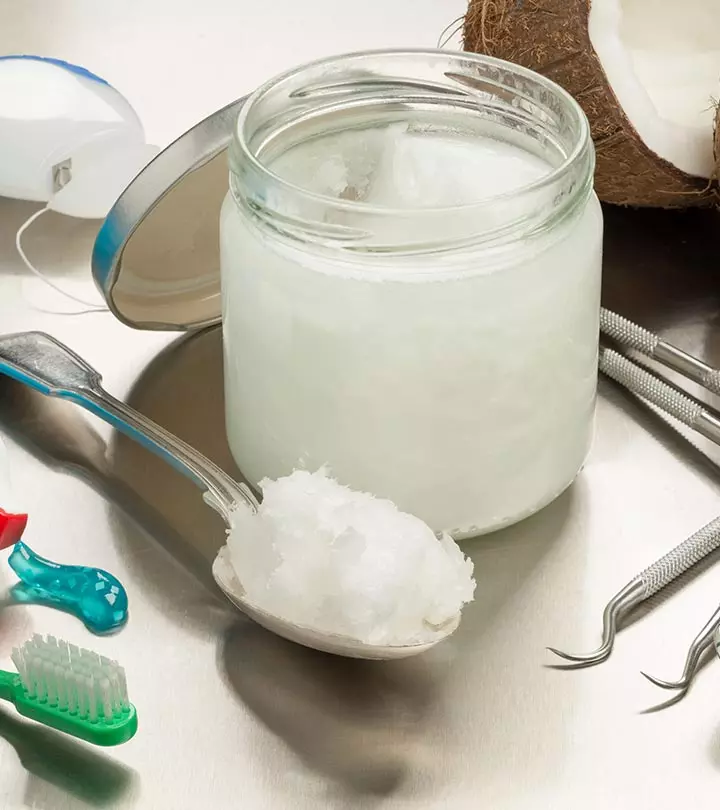
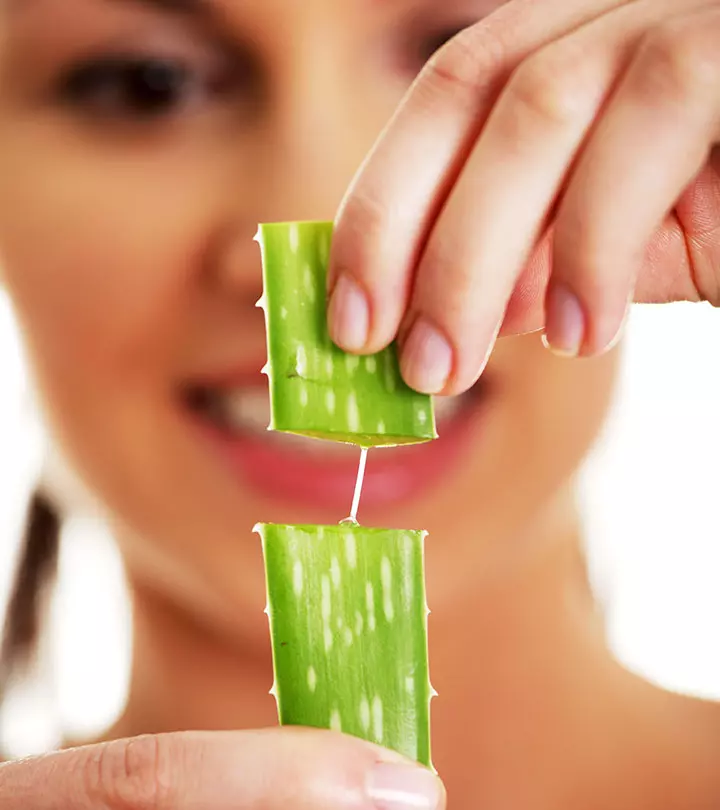
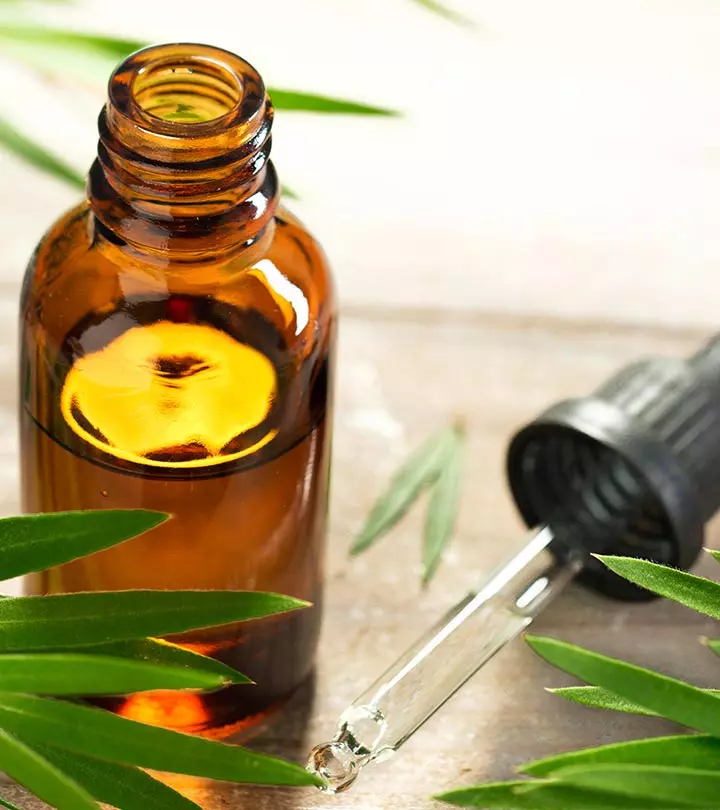


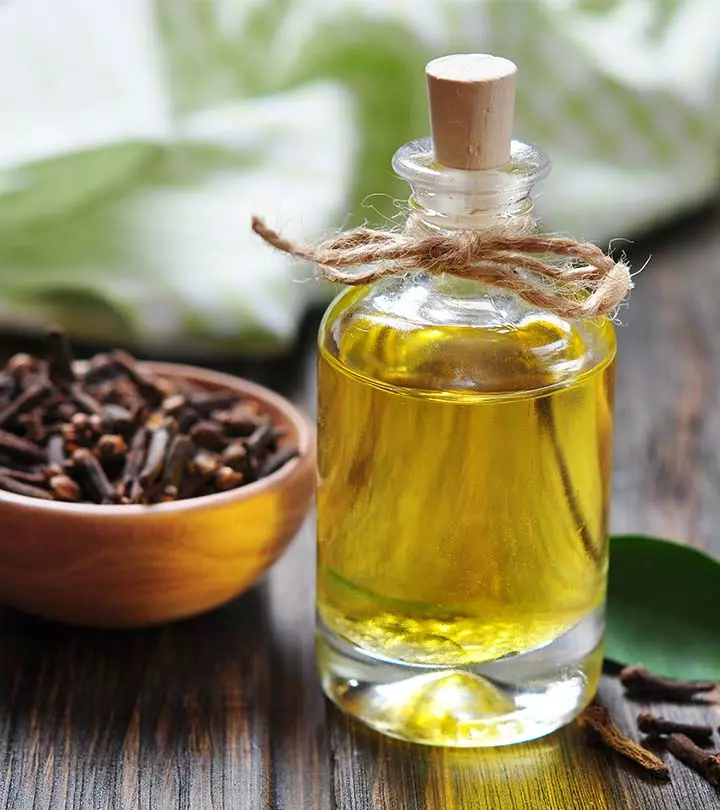
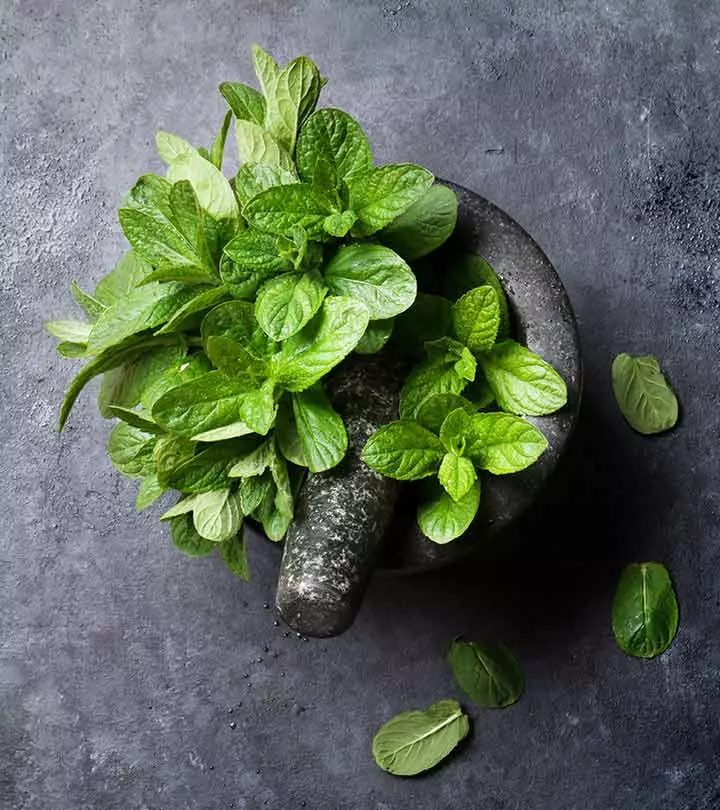
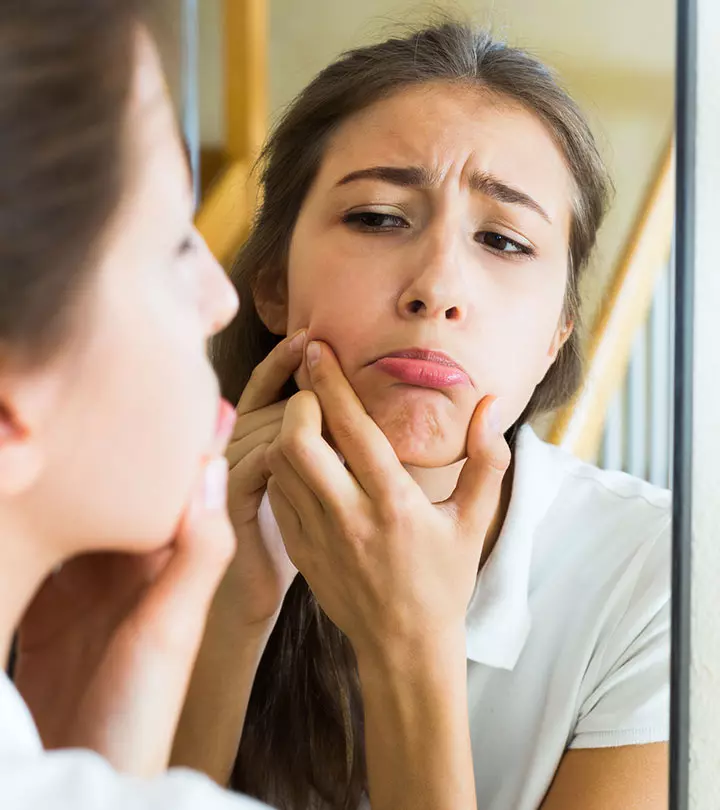
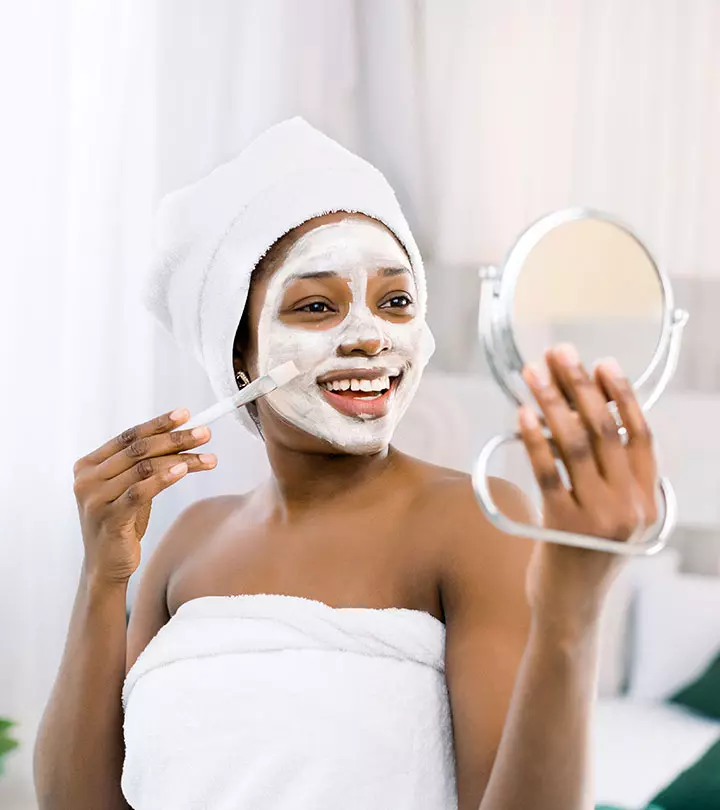


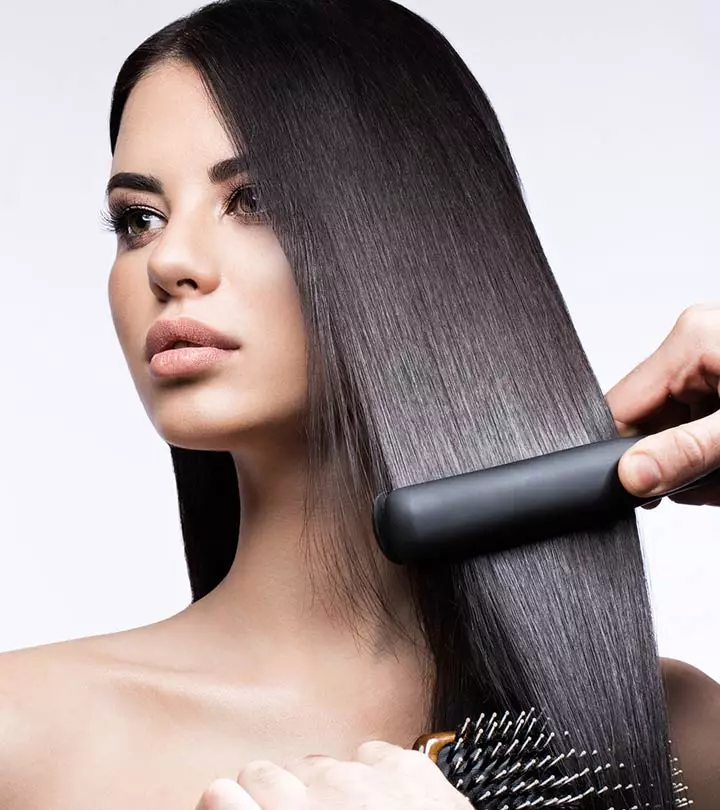
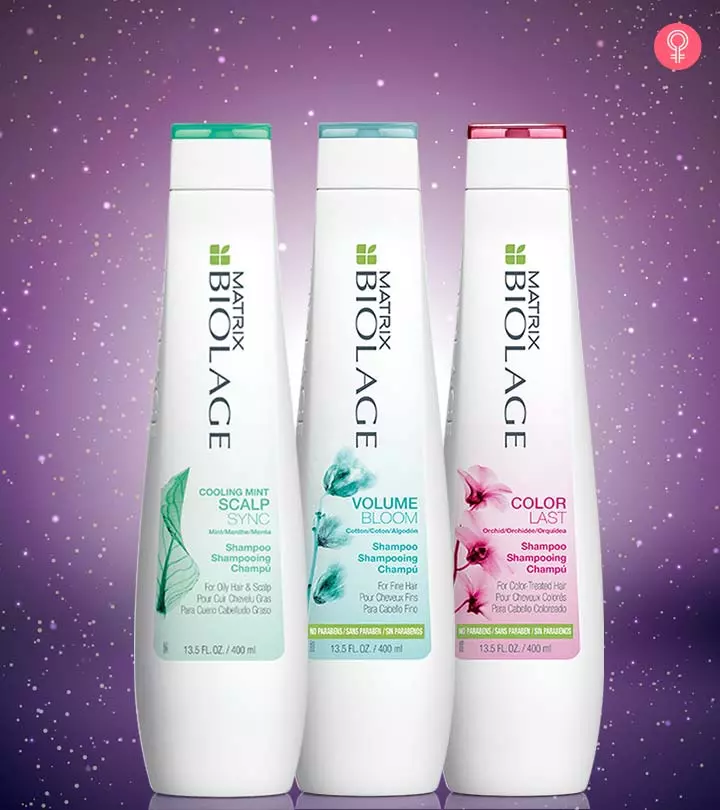








Community Experiences
Join the conversation and become a part of our empowering community! Share your stories, experiences, and insights to connect with other beauty, lifestyle, and health enthusiasts.